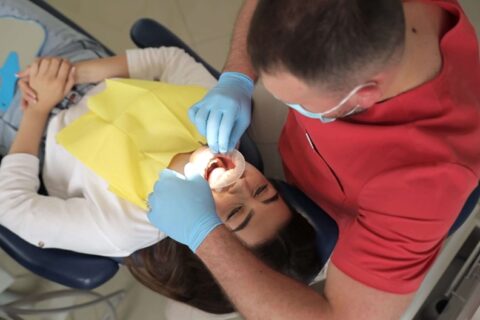The Role of Nutrition in Oral Health: Foods That Heal and Harm
What Are the Best Foods for Healthy Teeth?
Your daily food choices directly affect the health of your teeth and gums. The connection between nutrition and teeth goes beyond basic oral hygiene routines. What you eat feeds beneficial bacteria or harmful bacteria in your mouth. Families in Scottsdale and Paradise Valley, AZ, can protect their smiles through smart dietary decisions. At S&L Dental, we recognize how supporting dental health starts with what you eat. Your oral health diet plays a significant role in preventing cavities, gum disease, and avoiding tooth loss. Making informed choices about the right foods for healthy teeth benefits your entire family. Simple changes to your eating habits can strengthen your teeth naturally. It’s worth exploring the science behind nutrition and oral health to gain practical tools to maintain beautiful smiles.

How Nutrition Affects Oral Health
What you eat plays a significant role in keeping your teeth and gums strong. A balanced oral health diet provides essential nutrients and helps maintain a healthy mouth. Here’s how nutrition supports your teeth and gums:
- Calcium and Phosphorus: These minerals strengthen tooth enamel and repair daily wear.
- Vitamins: Nutrients like vitamin C support healthy gum tissue and prevent inflammation.
- Hydration: Drinking water boosts saliva production, which protects teeth by washing away food and reducing acid.
- Meal Timing: Structured meals limit acid exposure, giving your teeth time to recover and maintain a healthy pH balance.
- Protein and Minerals: These nutrients help your immune system fight bacteria and protect against gum disease.
Foods That Promote Healthy Teeth
A balanced diet supports strong teeth and gums. The right foods for healthy teeth can strengthen enamel, protect gums, and promote long-term oral health. Below are key nutrients and how they benefit your teeth:
- Calcium-Rich Foods:Milk, cheese, and yogurt provide calcium for strong enamel and bones. Leafy greens like kale and broccoli add vitamins for extra support.
- Vitamin C Sources:Citrus fruits, strawberries, and bell peppers help maintain healthy gums and fight infections.
- Vitamin D Options:Fortified foods and fish improve calcium absorption for stronger teeth.
- Crunchy Fruits and Veggies:Apples, carrots, or celery clean teeth, reduce plaque, and stimulate saliva.
- Protein-Packed Foods:Lean meats, fish, eggs, and nuts repair tissues and work with calcium to protect enamel.
- Green Tea:Contains natural compounds to fight bacteria and reduce mouth inflammation.
Foods and Habits That Harm Oral Health
Your diet plays an important role in keeping your teeth in a healthy state. Some foods and habits can weaken enamel, increase bacteria, and make it harder to maintain strong teeth. Key factors to keep in mind include:
- Sugary Snacks and Drinks:Sugar feeds bacteria that produce acids, which weaken enamel over time. Frequent consumption increases the risk of cavities.
- Acidic Foods and Beverages:Sodas, fruit juices, and citrus fruits can erode enamel if consumed excessively. Limit acidic items to protect your teeth.
- Sticky, Chewy Foods:Foods like dried fruits and gummy candies cling to teeth, creating more growth opportunities for bacteria.
- Frequent Snacking:Constant eating limits time for teeth to recover and remineralize, increasing acid exposure.
- Poor Hydration:Staying hydrated supports saliva production, which helps clean teeth and neutralize acids.
The Science Behind Sugar and Tooth Decay
Bacteria in your mouth convert sugar into lactic acid within minutes of eating. This acid lowers the pH level around your teeth, creating an environment that dissolves mineral content from enamel. The impact of sugar on teeth depends on the amount consumed and how long it stays in contact with the teeth. Your mouth’s natural pH level sits around 7.0, which supports healthy teeth. When pH drops below 5.5, enamel begins to weaken and dissolve. This process, called demineralization, creates the first stage of cavity formation. Reducing sugar intake helps protect teeth without eliminating enjoyable flavors. Natural sweeteners like stevia provide sweetness without feeding harmful bacteria. Fresh fruits offer natural sugars, vitamins, fiber, and water content that helps clean teeth. Choosing whole-grain foods, vitamin-rich foods, and preparing meals at home gives you more control over the sugar content of your food. This can be particularly important for your children’s dental health.
Meal Planning for Oral Health
Creating a tooth-friendly meal plan balances nutrition and teeth with practical family needs. Start each day with protein-rich breakfast options like eggs with whole-grain toast. Include dairy products or fortified alternatives to provide essential calcium. Lunch combinations should feature lean proteins, vegetables, and whole grains. Grilled chicken salads with mixed greens provide vitamins and minerals. Dinner meals can include fish rich in omega-3 fatty acids and vitamin D. Pair these proteins with steamed vegetables and whole-grain sides. Finally, look at raw vegetables with hummus, cheese cubes, or nuts to provide nutrients between meals. These foods for healthy teeth help maintain stable blood sugar levels while supporting oral health.
Recipe Ideas for a Healthy Smile
A bright and healthy smile requires adequate nutrition, which is where these tasty recipes come into play. Take charge of your oral health with recipe suggestions such as:
- Calcium-Rich Breakfast Smoothie: Blend 1 cup milk or fortified plant milk, 1/2 cup Greek yogurt, 1 handful spinach, 1/2 banana, and 1 tablespoon almond butter. This combination provides calcium, protein, and vitamins in a delicious morning drink.
- Tooth-Friendly Lunch Salad: Combine mixed greens, grilled chicken, cherry tomatoes, cucumber, and shredded cheese, then top with olive oil and lemon dressing. This meal provides protein, calcium, and vegetables that naturally clean teeth.
- Healthy Dinner Option: Bake salmon fillets with herbs and serve alongside roasted broccoli and quinoa. This combination delivers omega-3 fatty acids, calcium, and complete proteins for optimal oral health.
- Satisfying Dessert Alternative: Mix Greek yogurt with fresh berries and a drizzle of honey. Top with chopped nuts for added texture and nutrients. This dessert satisfies sweet cravings while providing probiotics and antioxidants.
Hydration and Oral Health
Water serves as your mouth’s primary defense system against harmful bacteria and acids. Proper hydration maintains adequate saliva production, naturally rinsing away food particles and neutralizing acids. Drinking water throughout the day supports your oral health and diet goals. Fluoridated water is essential, as it provides additional protection against tooth decay. This mineral helps strengthen tooth enamel and reverse early stages of cavity formation. Communities with fluoridated water systems show significantly lower rates of tooth decay across all age groups. Although many of us enjoy sports drinks and sodas, their ingestion should be limited or avoided. These beverages contain high levels of sugar and acids that harm tooth enamel. When consumed, use a straw to minimize contact with teeth and rinse with water afterward. Milk and unsweetened tea offer healthy beverage alternatives. Milk provides calcium and protein, while tea contains natural compounds that fight harmful bacteria.
FAQs About Nutrition and Teeth
Nutrition and oral health go hand-in-hand, but sometimes it can be confusing. Some frequently asked questions about nutrition for oral health include:
- Can diet alone prevent cavities? A healthy diet significantly reduces cavity risk but works best with proper oral hygiene methods. Brushing, flossing, and regular dental check-ups are crucial for optimal oral health.
- Are there specific foods that naturally whiten teeth? Certain foods for healthy teeth can help remove surface stains and support natural whiteness. Strawberries contain natural enzymes that may help remove stains, while pineapple contains bromelain, which may support natural whitening.
- How does diet affect gum health? Vitamin C deficiency can lead to bleeding and inflamed gums. Antioxidant-rich foods, Omega-3 fatty acids from fish, and a balanced diet support your immune system’s ability to fight gum disease.
- What are the best snacks for kids’ oral health? Cheese cubes provide calcium and help neutralize mouth acids, while raw vegetables like carrots and celery naturally clean teeth. Fresh fruits provide vitamins and a naturally sweet treat between meals.
Transform Your Smile With Proper Nutrition
The connection between nutrition and teeth affects every member of your family. Making informed choices can create lasting benefits for your dental health and overall wellness. In turn, professional dental care enhances the benefits of good nutrition by identifying problems early and providing preventive treatments. S&L Dental provides comprehensive family dental care to Scottsdale and Paradise Valley, AZ residents. Our experienced team offers preventive services, emergency treatment, and more to support your family’s oral health goals. Our friendly team can provide personalized recommendations for maintaining healthy smiles for a lifetime. Schedule your appointment with S&L Dental today!


